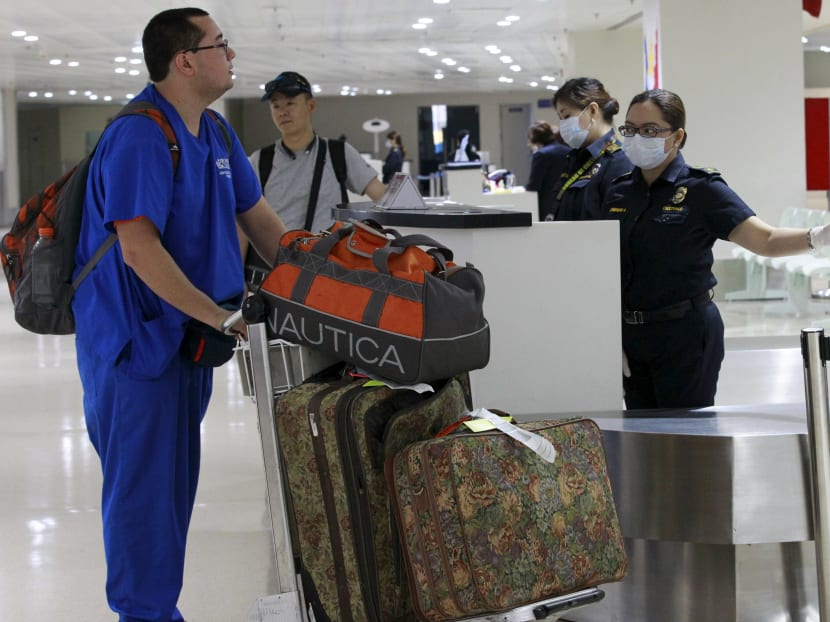S'pore steps up precautionary measures against MERS
SINGAPORE/HONG KONG/SEOUL — Singapore’s airports today (June 9) began conducting temperature screenings for passengers arriving from South Korea, as a precautionary measure against the spread of the Middle East respiratory syndrome (MERS), as other Asian cities also stepped up efforts to curb the outbreak.

A custom inspector wearing a face mask gestures to a flight passenger arriving from South Korea, as she shows the way out upon arrival at Ninoy Aquino International Airport in Manila, June 9, 2015. Photo: Reuters
SINGAPORE/HONG KONG/SEOUL — Singapore’s airports today (June 9) began conducting temperature screenings for passengers arriving from South Korea, as a precautionary measure against the spread of the Middle East respiratory syndrome (MERS), as other Asian cities also stepped up efforts to curb the outbreak.
Singapore’s Ministry of Health (MOH) today expressed concern over the surge in the number of confirmed MERS cases in South Korea, as well as the continued news of reported breaches of containment and quarantine measures there. The temperature screenings are an “additional precautionary measure for the early detection of MERS-CoV cases from the country”, said the ministry, adding that travellers arriving by air from South Korea would also receive health advisories.
The measures are in line with those put in place for passengers arriving from the Middle East, where MERS cases were first reported. Temperature screenings at airports have been conducted for such passengers since May 18 last year, and health advisories are also distributed at border checkpoints to travellers coming from and going to the Middle East.
The MOH noted that temperature screenings may not pick up all imported cases, due to MERS’ long incubation period of up to 14 days, as well as the presence of mild and asymptomatic cases. “Our hospitals and doctors, therefore, remain vigilant for cases with relevant travel history that may not have symptoms when arriving in Singapore, but have since developed symptoms when they consult the doctors,” the ministry said, adding that such cases have not been known to transmit disease during the time when no symptoms are shown.
It also said all hospitals here are ready to screen and isolate suspected cases. Patients with signs of pneumonia or severe respiratory infection with breathlessness, and those who had travelled to the Middle East and South Korea two weeks prior, will be evaluated to rule out MERS infection.
No cases of MERS has been reported in Singapore. “However, even if there is an imported case, the risk of an outbreak in our community remains low, as sustained human-to-human transmission of the virus has not been reported,” the MOH said.
The ministry added that though the World Health Organization (WHO) does not recommend the application of any travel or trade restriction to areas affected by MERS, Singaporeans travelling to affected areas are advised to maintain their vigilance and adopt health precautions, including observing good personal hygiene at all times and avoiding contact with camels and other live farm or wild animals.
It said that on their return from an area affected by MERS, Singaporeans should monitor their health closely for two weeks. They need not quarantine themselves on their return if they have no symptoms of illness. However, they should wear a surgical mask and seek medical attention promptly if they become unwell with fever and cough. “Truthful declaration of travel history is important. Singaporeans may be isolated for observation and further investigations, which may take up to 48 hours,” said the MOH.
Eight new MERS cases were reported in South Korea today, bringing the total to 95, with seven fatalities.
The seventh reported MERS death in South Korea was a 68-year-old woman who had an existing heart ailment and had been in the emergency room of a Seoul hospital, where a number of previous confirmed cases had been traced.
Meanwhile, Hong Kong today issued a “red alert” advisory against non-essential travel to South Korea. “At this stage, to issue a clear message is something the Hong Kong government thinks is necessary,” said the territory’s No 2 official, Ms Carrie Lam.
Macau has required masks for people entering local healthcare facilities, and advised residents to avoid travelling to South Korea unless absolutely necessary.
Japan has set up task forces at its diplomatic missions in South Korea to help its nationals there deal with the spread of MERS, Foreign Minister Fumio Kishida announced today.
The WHO today began work on a joint mission with South Korean doctors and officials to review the country’s response and analyse the virus.
The virus has been spreading in South Korea since a 68-year-old businessman brought it home from a Middle East trip last month.
About 2,892 South Koreans who may have had contact with MERS patients have been put under quarantine, some in hospitals, but most at home. South Korea’s new cases bring the total number of MERS cases globally to more than 1,200, based on WHO data, with at least 440 related deaths. AGENCIES






